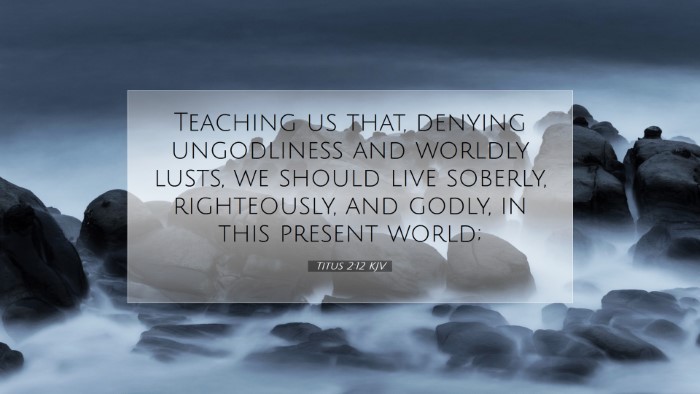Old Testament
Genesis Exodus Leviticus Numbers Deuteronomy Joshua Judges Ruth 1 Samuel 2 Samuel 1 Kings 2 Kings 1 Chronicles 2 Chronicles Ezra Nehemiah Esther Job Psalms Proverbs Ecclesiastes Song of Solomon Isaiah Jeremiah Lamentations Ezekiel Daniel Hosea Joel Amos Obadiah Jonah Micah Nahum Habakkuk Zephaniah Haggai Zechariah MalachiTitus 2:12
Titus 2:12 KJV
Teaching us that, denying ungodliness and worldly lusts, we should live soberly, righteously, and godly, in this present world;
Titus 2:12 Bible Commentary
Titus 2:12 Commentary
Titus 2:12: "Teaching us that, denying ungodliness and worldly lusts, we should live soberly, righteously, and godly, in this present world."
Introduction
The epistle to Titus is a profound letter from the Apostle Paul that addresses the establishment of order within the church and the conduct expected of its members. In Titus 2:12, Paul emphasizes the transformative nature of grace and its practical outworking in the lives of believers. This verse encapsulates the essence of Christian conduct, urging believers to pursue a life that is in stark contrast to the prevailing worldly standards.
Exegesis of Titus 2:12
This verse serves as a key component in Paul's discussion on the roles of different groups within the church. Paul articulates that the teaching of grace not only forgives sinners but also instructs them in righteous living. The phrase "teaching us" denotes an active engagement of divine grace in the lives of believers, indicating that grace functions pedagogically to mold and guide believers’ ethical behavior.
- Denying Ungodliness: The first imperative is to deny ungodliness, which refers to a rejection of any behavior that contradicts God’s nature and His commandments. This aspect of denial necessitates a conscious choice to resist sinful inclinations and worldly temptations.
- Worldly Lusts: The term "worldly lusts" signifies desires that conflict with godly living—those temptations that stem from a life disconnected from divine purposes. The call here is to actively shun such desires, mirroring the need for self-control.
- Soberly, Righteously, and Godly: The subsequent phrase outlines the manner of life Christians are to adopt. "Soberly" suggests a balanced and clear-minded perspective on life, free from excess. "Righteously" refers to living according to God’s standards and fulfilling moral obligations. "Godly" encapsulates the attributes of serving and reverencing God, embodying a life reflective of His character.
Insights from Public Domain Commentaries
Matthew Henry
Matthew Henry remarks that this teaching of grace invites a transformative response from believers, urging them to engage actively in the pursuit of holiness. He notes that the denial of worldly lusts is integral to the Christian faith, as it fosters growth in godliness. Henry implies that the Christian life is characterized by both negative (denial) and positive (living soberly, righteously, and godly) actions, suggesting a wholesome framework for a lifestyle that honors God.
Albert Barnes
Barnes emphasizes that the grace mentioned here does not only refer to unmerited favor but is also instructional. He posits that the disavowal of ungodliness and worldly desires is a prerequisite for a life that aligns with God's will. He further discusses that living soberly denotes not just abstaining from excess but also living with a sense of purpose and clarity of life's priorities, underlining the duality of grace that both redeems and trains.
Adam Clarke
Clarke highlights the importance of grace in leading believers to choose righteousness and godliness over worldly enticements. He points out that the present world, with all its allurements, acts as a contrasting backdrop to what is promoted in the life of a believer. Clarke’s interpretation suggests that living godly lives in a corrupt society is both a challenge and a duty for Christians, and underscores the necessity of divine assistance in this endeavor.
Theological Implications
The theological richness of Titus 2:12 extends beyond practical Christian ethics; it speaks to the transformative power of grace in the lives of believers. The imperative of grace includes:
- The Role of Grace: Grace is not merely a tool for justification; it also empowers sanctification. This highlights the holistic view of salvation in Christian theology, where believers are justified before God and progressively sanctified in their actions and character.
- Ethics in Context: The call to deny worldly passions and pursue a godly life reflects a broader biblical theme of holiness. Believers are continuously reminded that their conduct towards others, and their inner lives must resonate with God's standards as articulated in Scripture.
- The Present World: Paul refers explicitly to the 'present world,' acknowledging that believers live in a time marked by temptation and moral ambiguity. Thus, the call to live soberly and righteously is especially critical in a culture that often endorses values contrary to those upheld in the Christian faith.
Applications for Today
The practical applications of Titus 2:12 are numerous and vital for contemporary believers:
- Personal Reflection: Christians are encouraged to engage in self-examination concerning their lifestyle choices. This includes assessing one's priorities, behaviors, and influences in light of this verse's teachings.
- Community Accountability: The verse underscores the necessity of accountability within the community of faith, as believers encourage one another to uphold the tenets of Christian living, especially in the face of cultural pressures.
- Teaching and Discipleship: Pastors and church leaders can take this verse as a basis for teaching that integrates sound doctrine with practical applications. This dual focus ensures that the church functions as a nurturing ground for the development of godly character.
Conclusion
Titus 2:12 serves as a succinct and powerful summary of the ethical implications of grace for the lives of believers. It beckons all who consider themselves followers of Christ to a higher standard of living, rooted in the transformative power of God’s grace.
As pastors, students, theologians, and scholars reflect on this verse, may it inspire profound commitment to a life that exemplifies the core tenets of faith—denying worldly indulgences and pursuing a life marked with sobriety, righteousness, and godliness.


